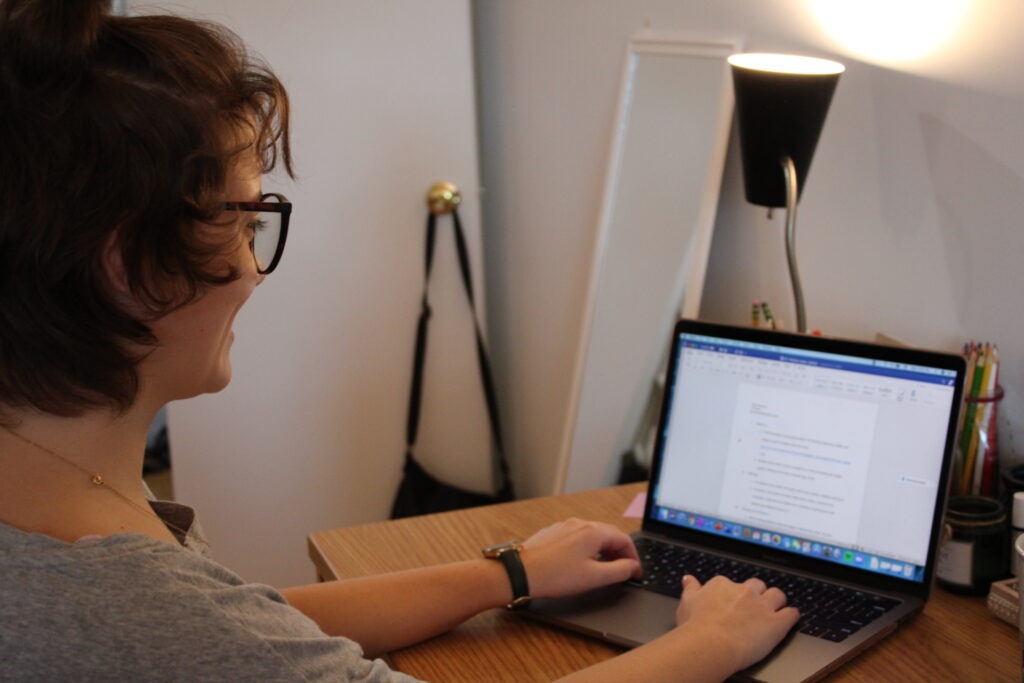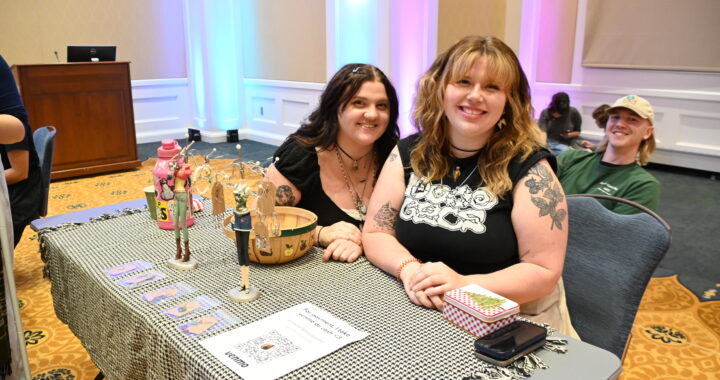Blue light glasses aiding students amid a virtual semester
3 min read
Junior Amber Elder using blue light glasses while doing work to limit any headaches | Matthew Simmons, Staff Photograhper
By MARISOL POWELL
Staff Writer
Schools across the nation have had to switch numerous in-person classes to online, leading many students to have prolonged exposure to their digital devices. The blue light that emanates from our screens has been extensively studied for its negative effects, such as Harvard students’ claim that lengthy exposure during the night can affect people’s sleep cycles. Products to deter blue light have gained little to no traction in previous years.
Now, thanks to the pandemic, how are students protecting themselves against this damaging light?
“I have noticed that prolonged use of my devices tend to give me quite a headache,” said Rachel Hess, a junior and biology major.
April Holmes, a sophomore, agreed, saying, “The blue light and long hours looking at a screen could certainly be contributing to headaches for me.”
“I spend a lot of my free time on the computer, especially in the evening after I’m finished with my homework,” said Melissa Madsen, a sophomore English major. “Whenever I go to bed right after I close my screen, I fall asleep a lot slower than when I haven’t looked at a screen all night. I don’t usually notice it because I lie awake for a while anyways before falling asleep, but lately it’s been getting more and more noticeable as school’s started up again and I’m constantly stressed about getting all my work done.”
Overall, headaches were the common trend among the community as well as interrupted sleep patterns.
“I’ve noticed the blue light is causing eye strain,” Aaron Sullivan, a sophomore and business administration major, said.
Surprisingly, few reported arising eye issues.
Some students are implementing new strategies to cut down on their screen time such as consistent breaks.
“[Taking breaks] can sometimes be hard when there are immediate due dates on assignments,” Hess said. “Normally small breaks in between assignments is enough to recover from a brief headache.”
Others are focused on a more direct approach, planning on powering through their workload instead.
“I’m currently working on getting into a no-procrastination mindset,” Madsen said. “My goal is to get my work done earlier than the night before it’s due, thus resulting in my screen time being more spread out during the day, way less stress and a reduced chance of staying up till midnight staring at my screen.”
Investing in technological aid is also an alternative for some.
“Blue light blocking glasses would be helpful,” said Holmes. “On some devices, you can turn on a setting that changes the color of light that the screen emits. I have that turned on during the night when I’m working.”
Though there is blue light blocking technology built into some of the devices of today, not all have that privilege of a feature.
“There is a setting on my phone that is called a ‘warm light’ which tends to make the screen a more orange color than blue which I use in order to combat the side effects,” Sullivan said. “I also try to stay off of my laptop at night before I go to bed because my laptop doesn’t have the ‘warm light’ setting.”
Students feel this is a significant issue arising from online work that UMW has not taken into account.
“I also think that they have much bigger problems to worry about currently,” Holmes said. “I don’t blame them for prioritizing other things over it.”
Studious individuals continue to trek through the sea of virtual assignments with grades as a first priority. The UMW community is seemingly taking these new changes in strides.
Some advice from students to those severely affected and combatting their blue light intake is to have consistent naps if need be and take prescribed medicines such as headache aids. Madsen suggested going for walks outside, an opportunity to take advantage of the crisp autumn weather.
Though attitudes are rather optimistic and motivated, students still hold a perspective of realism in the world’s current state.
“Until COVID-19 has a vaccine,” Madsen said, “be prepared for even more screen time.”


